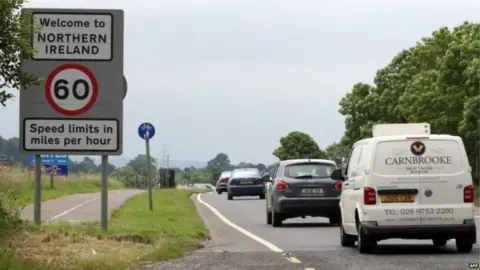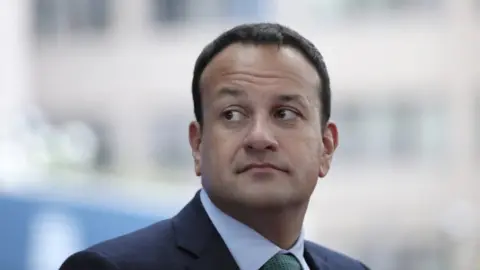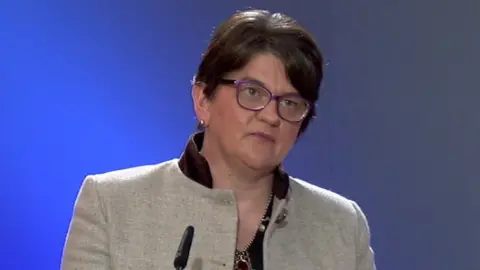'No question' of north-south travel ban - Leo Varadkar
 AFP
AFPLeo Varadkar has said the Irish government is not planning to ban cross-border travel despite infection rates being higher in Northern Ireland.
It had been reported he advised against cross-border travel to NI at Christmas.
NI First Minister Arlene Foster said she was "astounded" by the reports, after years of "being lectured" about the open border during Brexit talks.
But Mr Varadkar clarified there was "no question of there being an outright travel ban between north and south".
"It's not under consideration, not being discussed - period," he told the Dáil (Irish parliament) on Thursday.
"We don't have a travel ban with Poland, we're certainly not going to have one with Northern Ireland," the tánaiste (Irish deputy PM) said.
But Mr Varadkar added that the government will continue to ask people not to move between counties.
'Inter-county travel including cross-border travel'
The tánaiste further clarified that as the Republic of Ireland moves from level five to level three restrictions next week "inter-county travel will still be restricted and will only be allowed for work, school or essential purposes like caring for an elderly relative".
"So that means that inter-county travel including cross-border travel for shopping or visiting friends and relatives will not be allowed," he said.
He added that they hoped to be in a position to advise people that they can travel between counties, including Northern Ireland, in order to visit friends and relatives closer to Christmas, but that will depend on the epidemiological data at that point.
 EPA
EPAWhen asked about previous comments about cross-border travel, a spokesman for Mr Varadkar said the Fine Gael meeting where he was reported to have raised the issue was "private".
However, he referred to remarks Mr Varadkar made in the Dáil on Tuesday about the "real risk" of north-south travel within Ireland.
The tánaiste referred to the higher infection rate in Northern Ireland and said the "less intensive approach to the virus there, since the start, has its consequences".
On Thursday afternoon, Northern Ireland's first and deputy first ministers were asked about the disparity in Covid regulations on both sides of the border and their effect on public compliance.
"I have to say I was astounded if not a little surprised that the tánaiste was indicating that people from the Republic of Ireland would not be able to travel to see their families in Northern Ireland during the Christmas period," First Minister Arlene Foster said.
"It appears that the border has made a reappearance again, after Northern Ireland being lectured for four years in the context of the European Union negotiations that the border was completely open."
Ms Foster said Mr Varadkar's remarks were "really regrettable" and she called for "good cooperation actually across the whole of the British Isles so that families can be together in appropriate way over the holiday period".

Deputy First Minister Michelle O'Neill said: "Commonality of approach is key and I would much prefer we were far more aligned than we have been to date."
She said the Irish government's position on Christmas restrictions would not be known until the outcome of a cabinet meeting in Dublin on Friday.
Before Mr Varadkar clarified his stance on cross-border travel, a Sinn Féin spokesperson said closing the borders would show "no awareness of the realities of the life along border communities, where family members live on both sides of the border and where tens of thousands cross the border daily to work, to go to school, or to access health and other services".
SDLP leader Colum Eastwood said Dublin and Stormont should "align our restrictions as far as possible north and south" over Christmas.
The Republic of Ireland is five weeks into a six-week lockdown, during which people are living under the government's highest level of public health restrictions.
Northern Ireland's Covid regulations are less strict, but Stormont has imposed a two-week circuit breaker from Friday which, along with other measures, will see all non-essential retail close for the first time since the summer.
The circuit breaker was announced prior to a UK-wide agreement which will see rules relaxed across England, Scotland, Wales and Northern Ireland for a five-day period over Christmas.
Up to three families will be allowed to form exclusive social bubbles in the UK between 23 and 27 December.
When the agreement was announced on Sunday, UK ministers said they "also recognised that people will want to see family and friends across the island of Ireland, and this is the subject of discussions with the Irish government".
